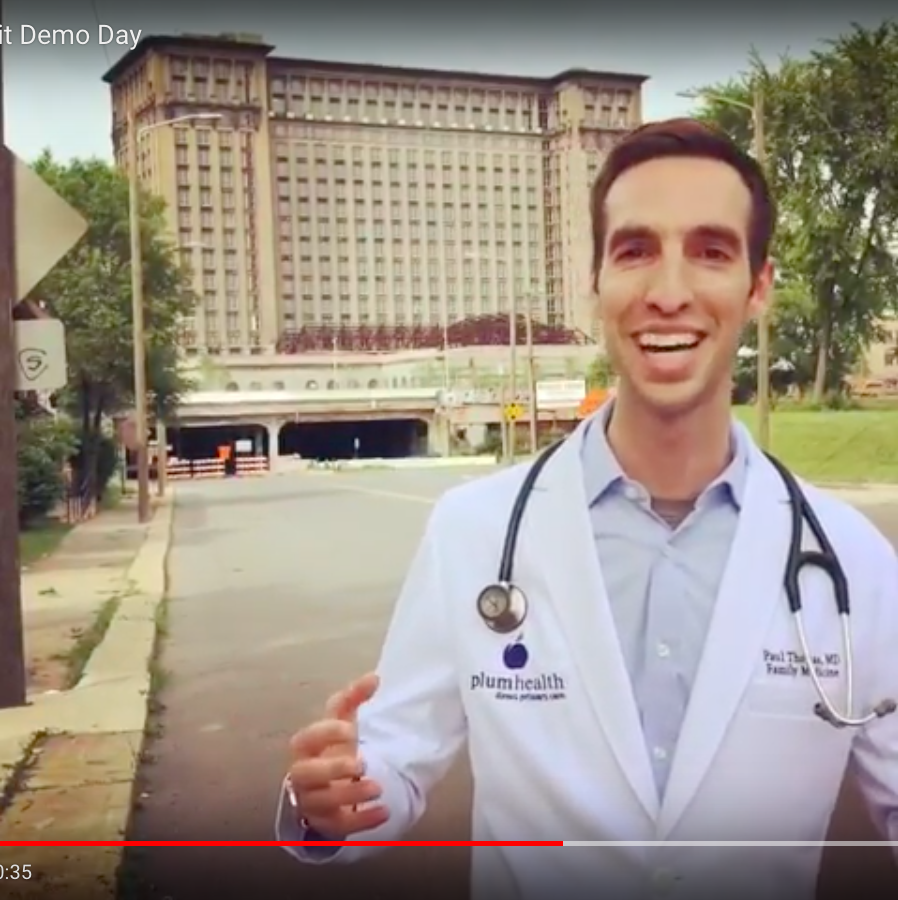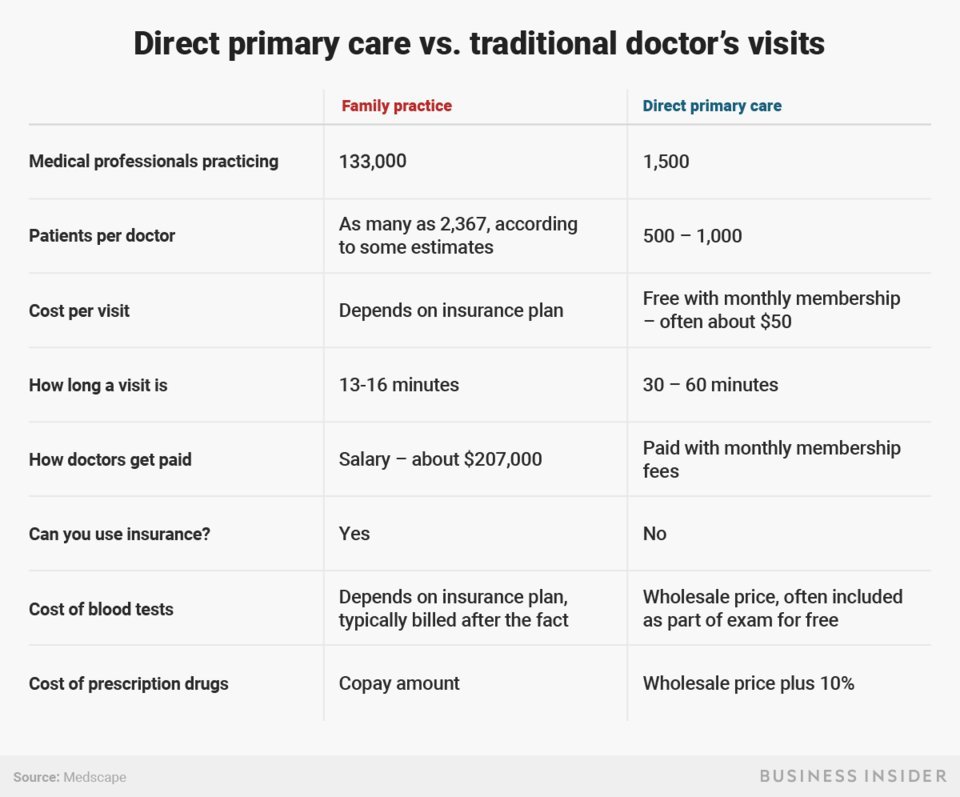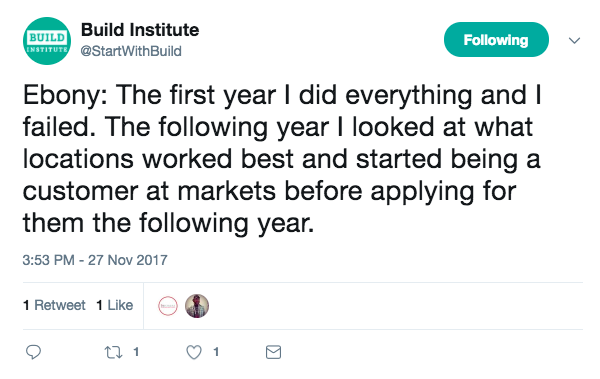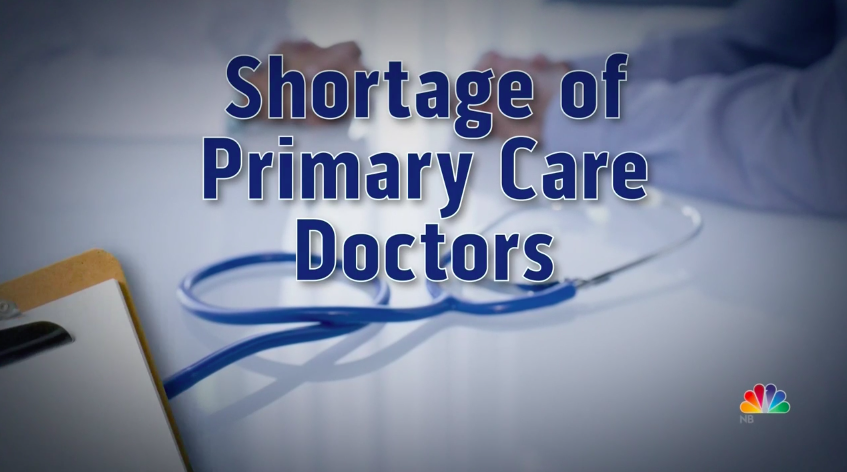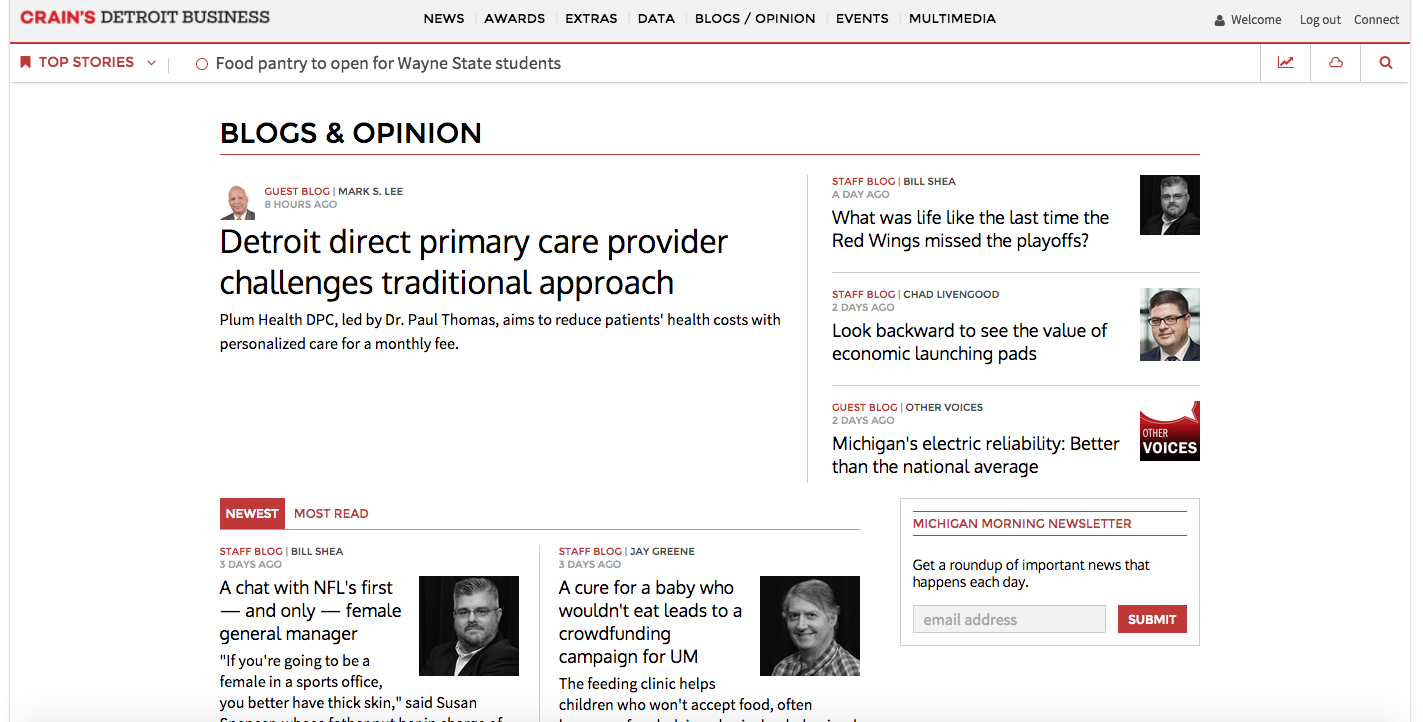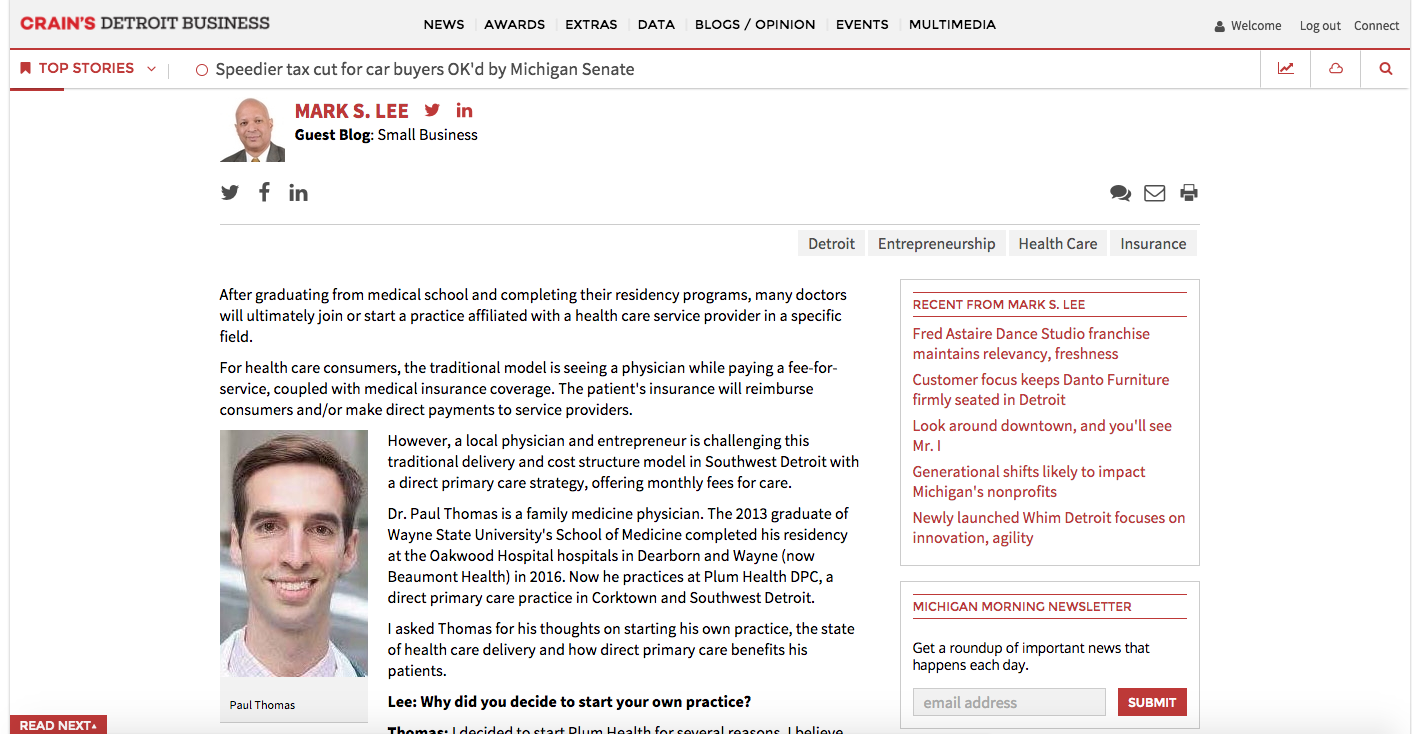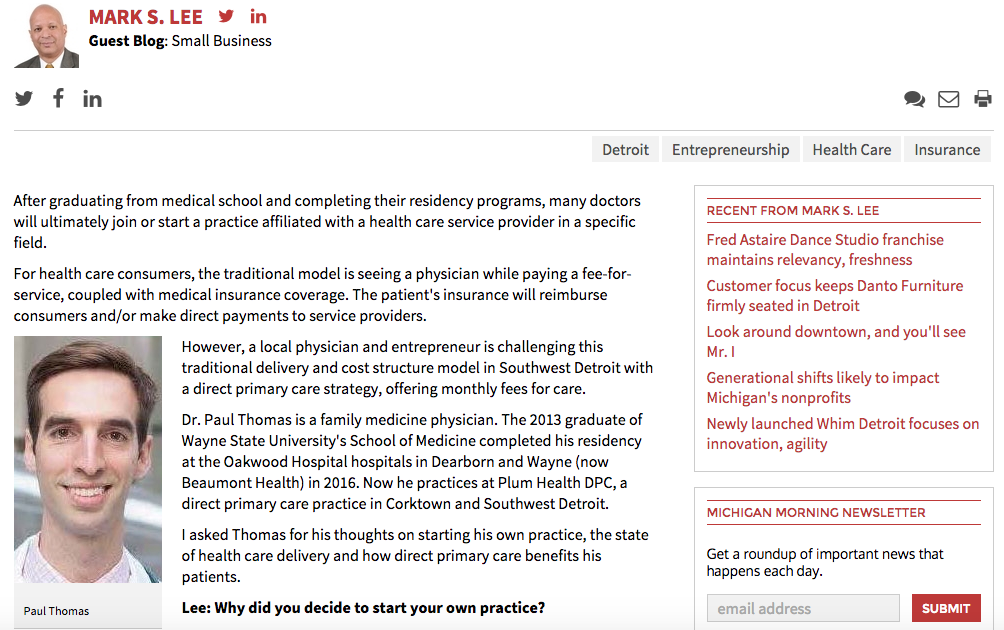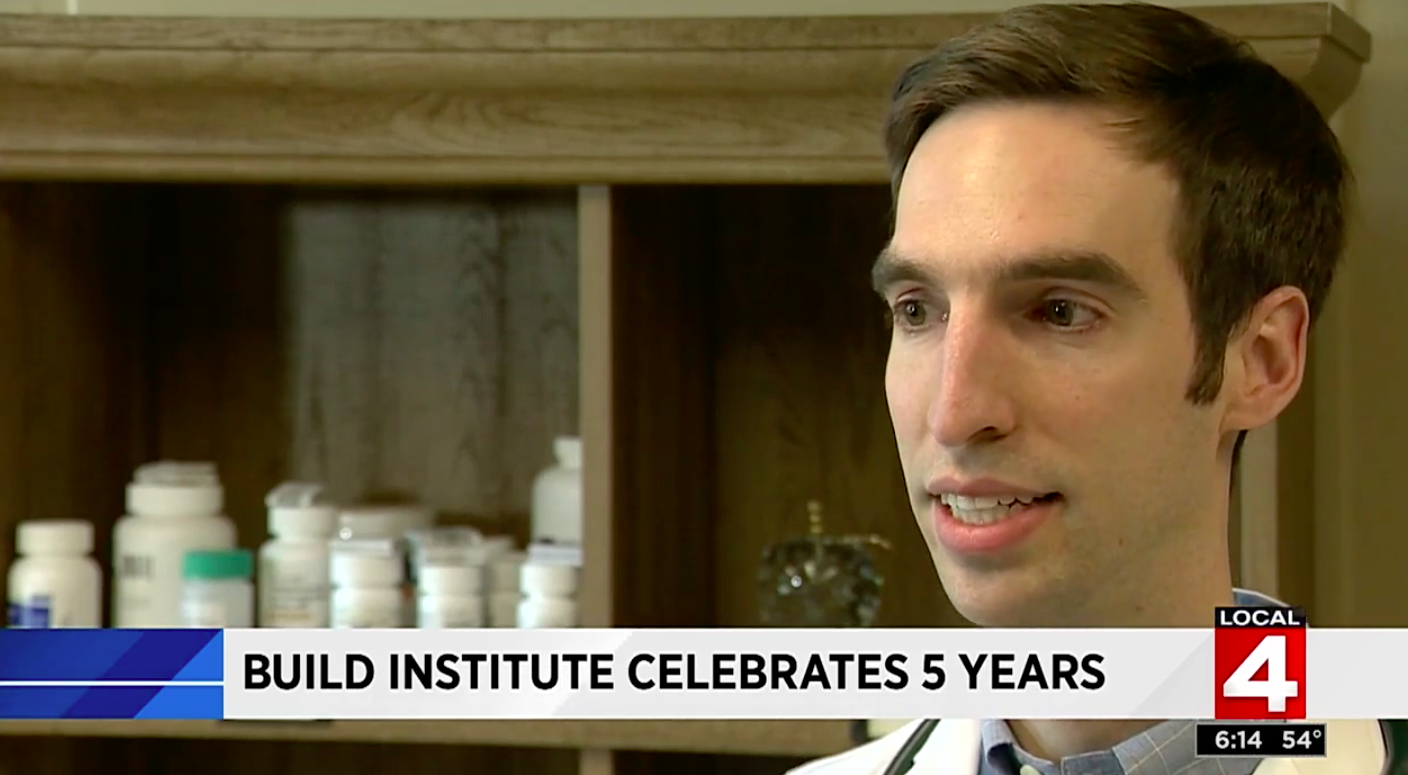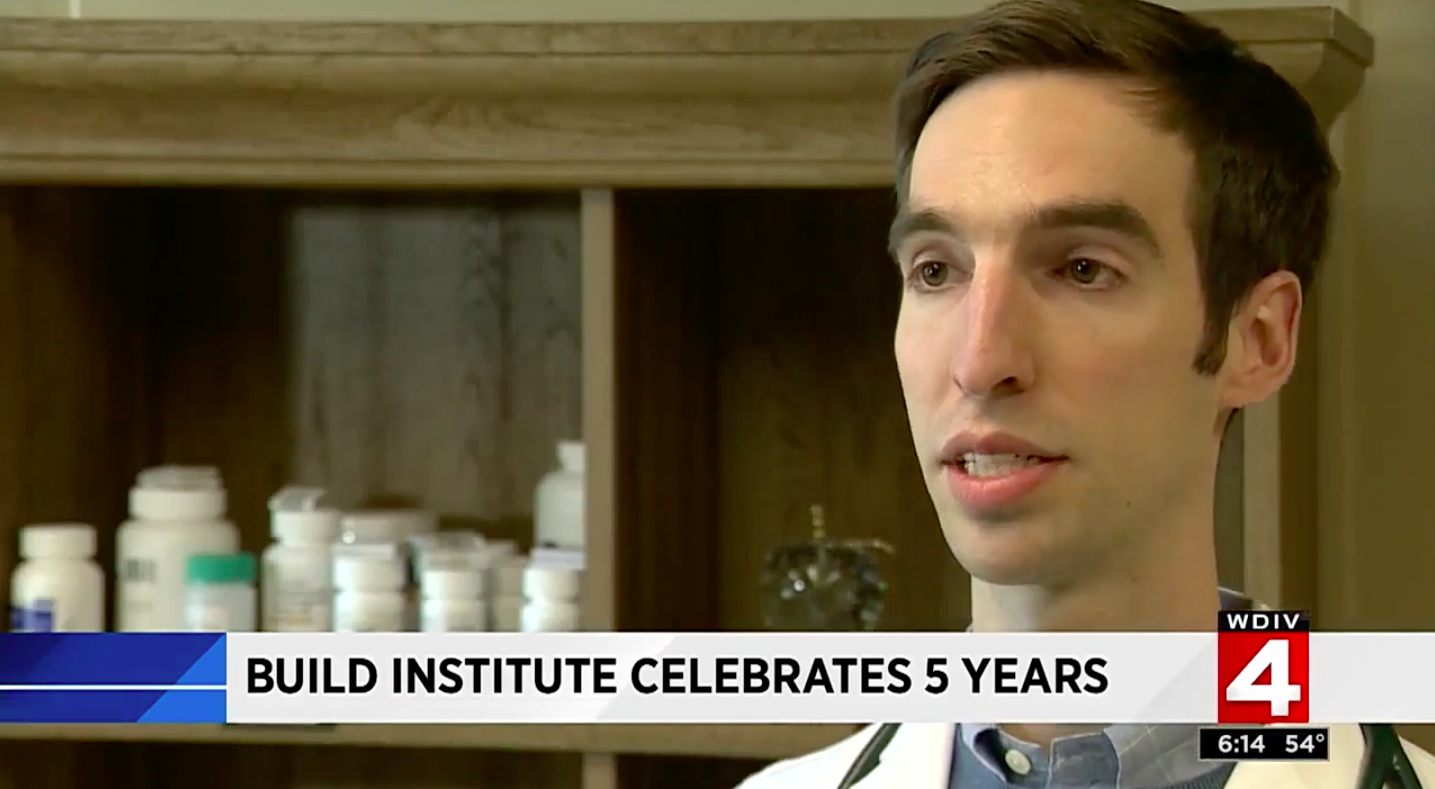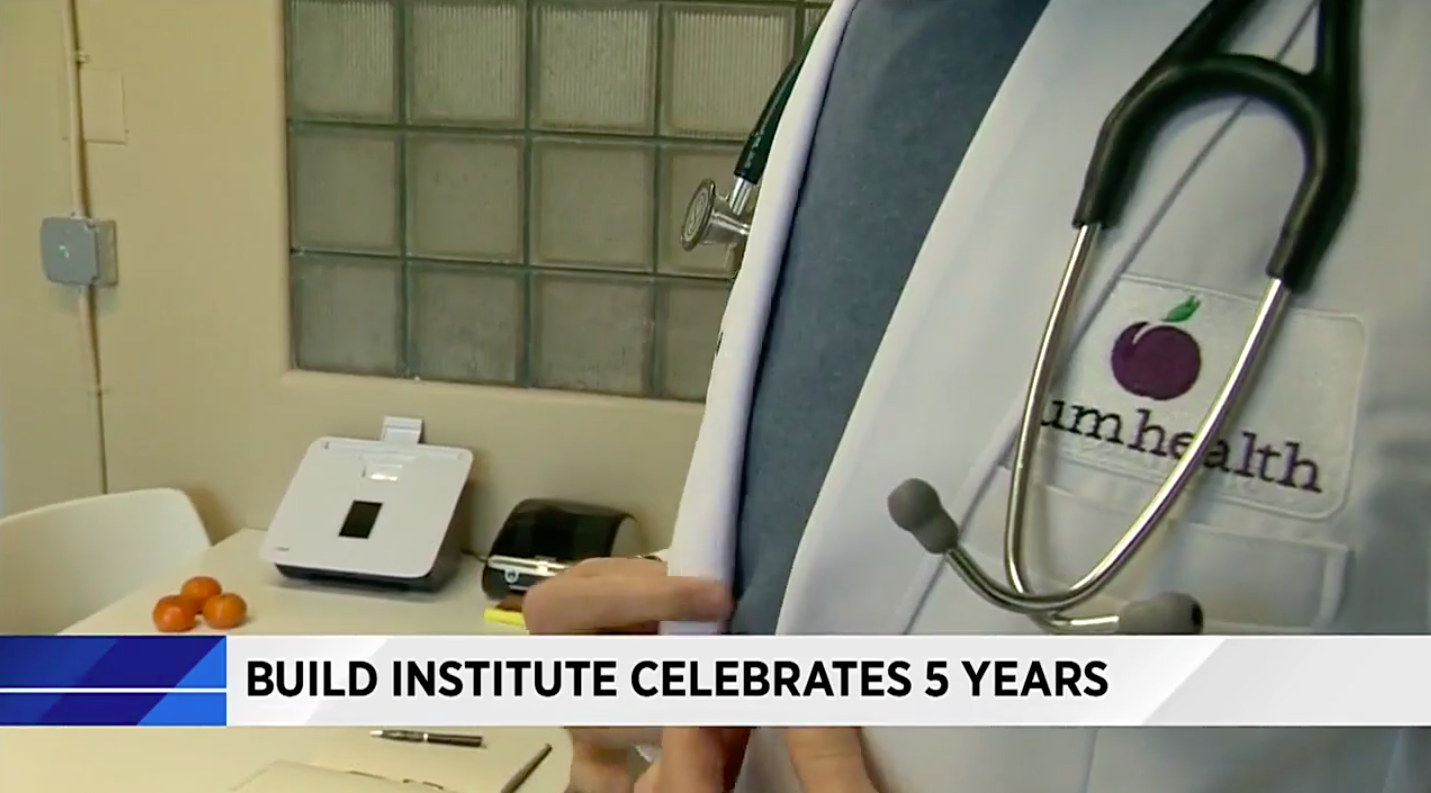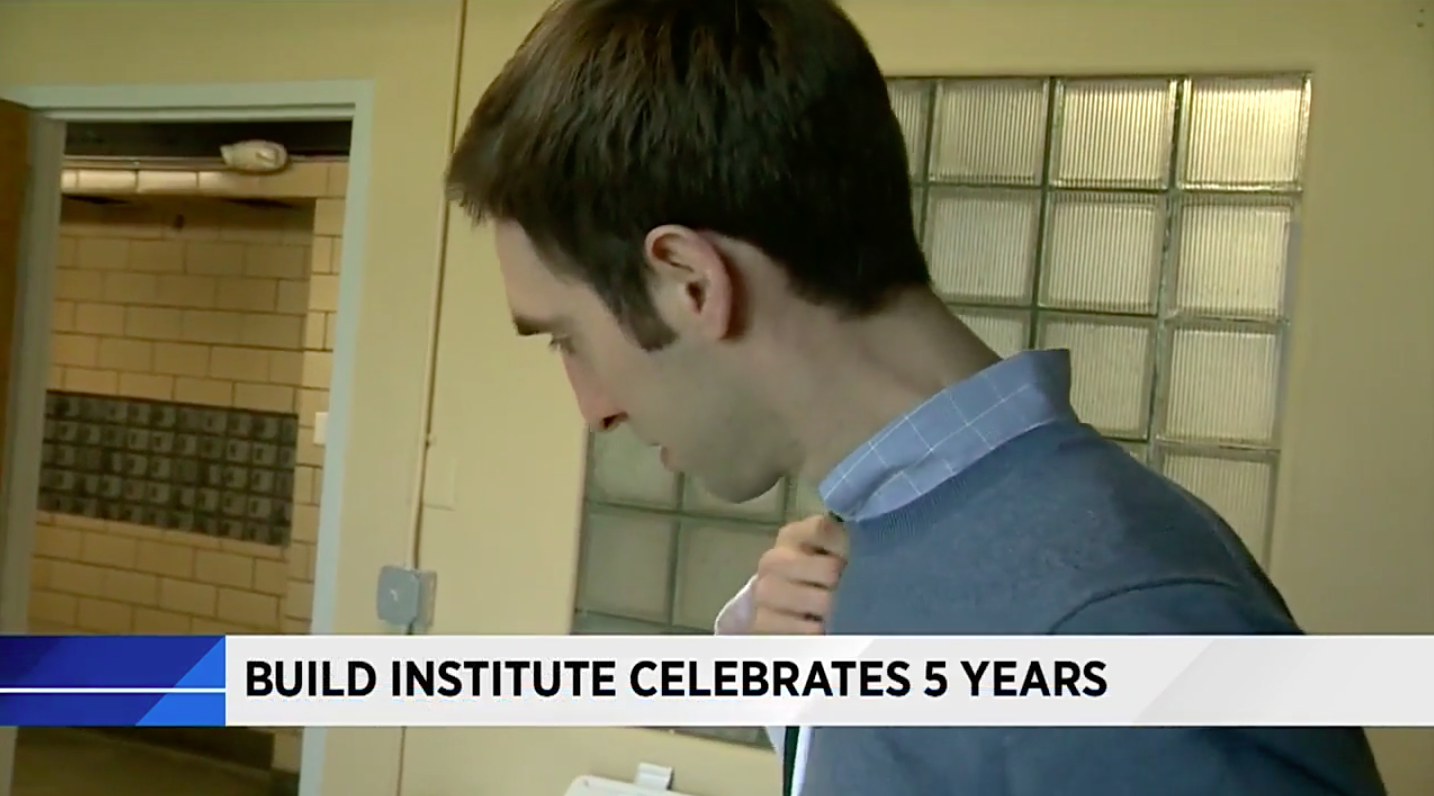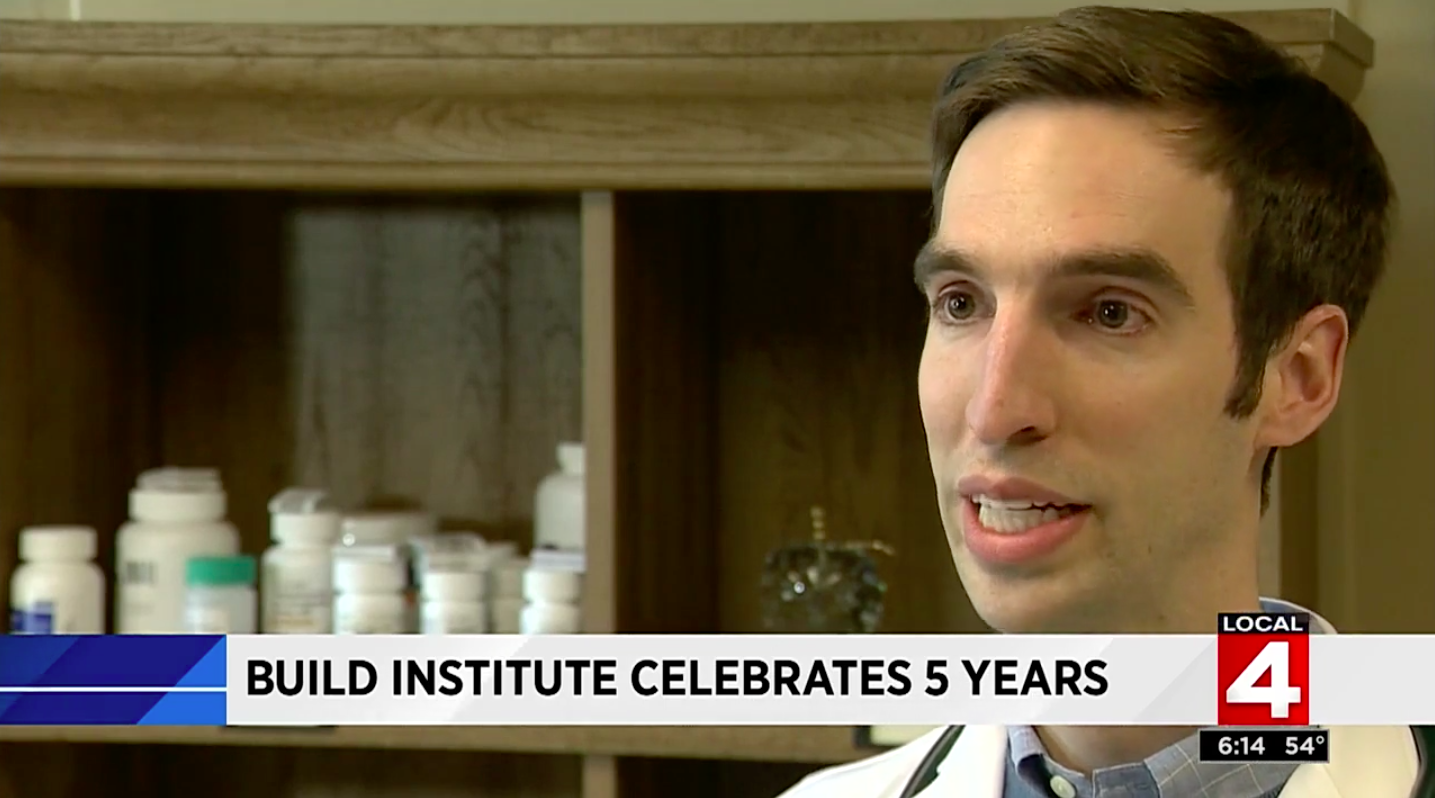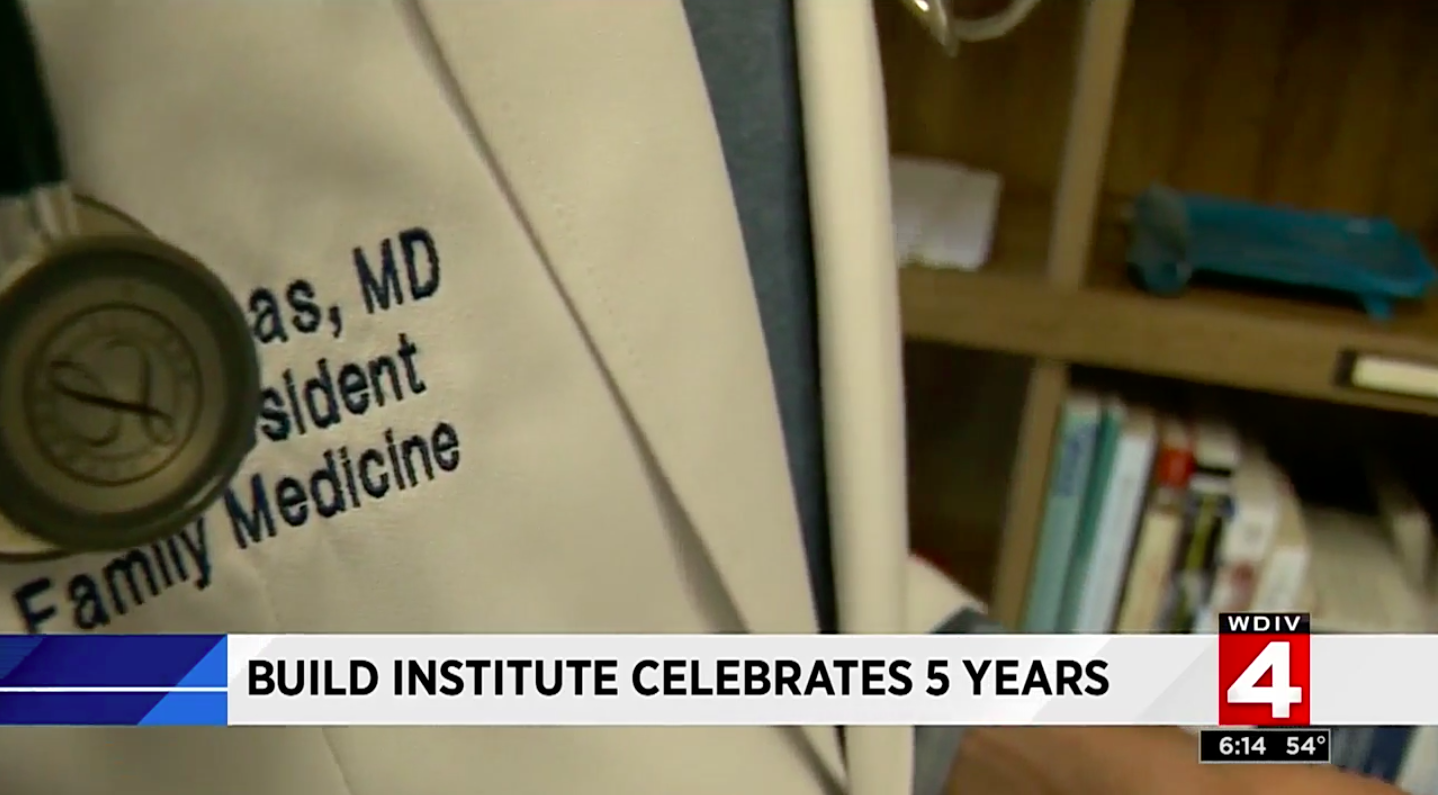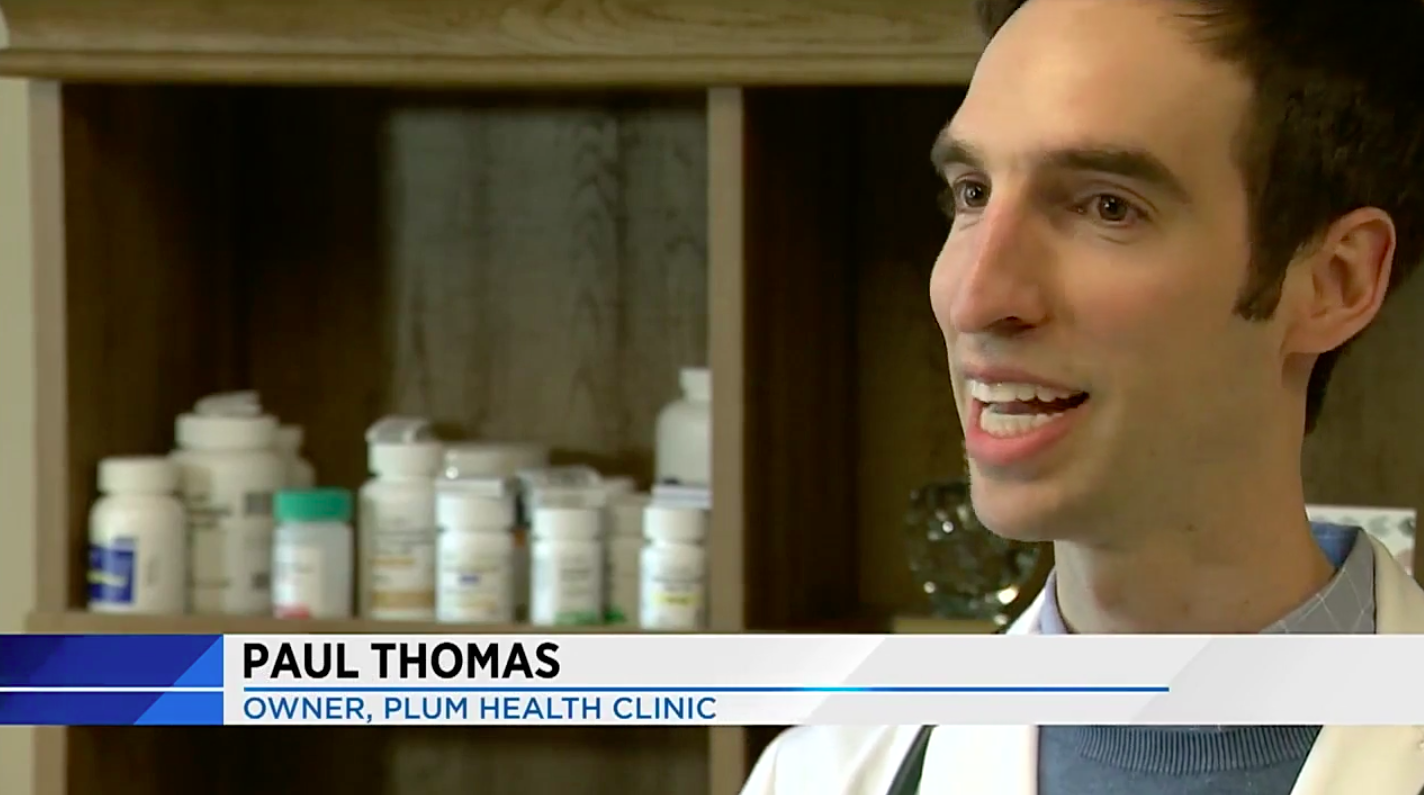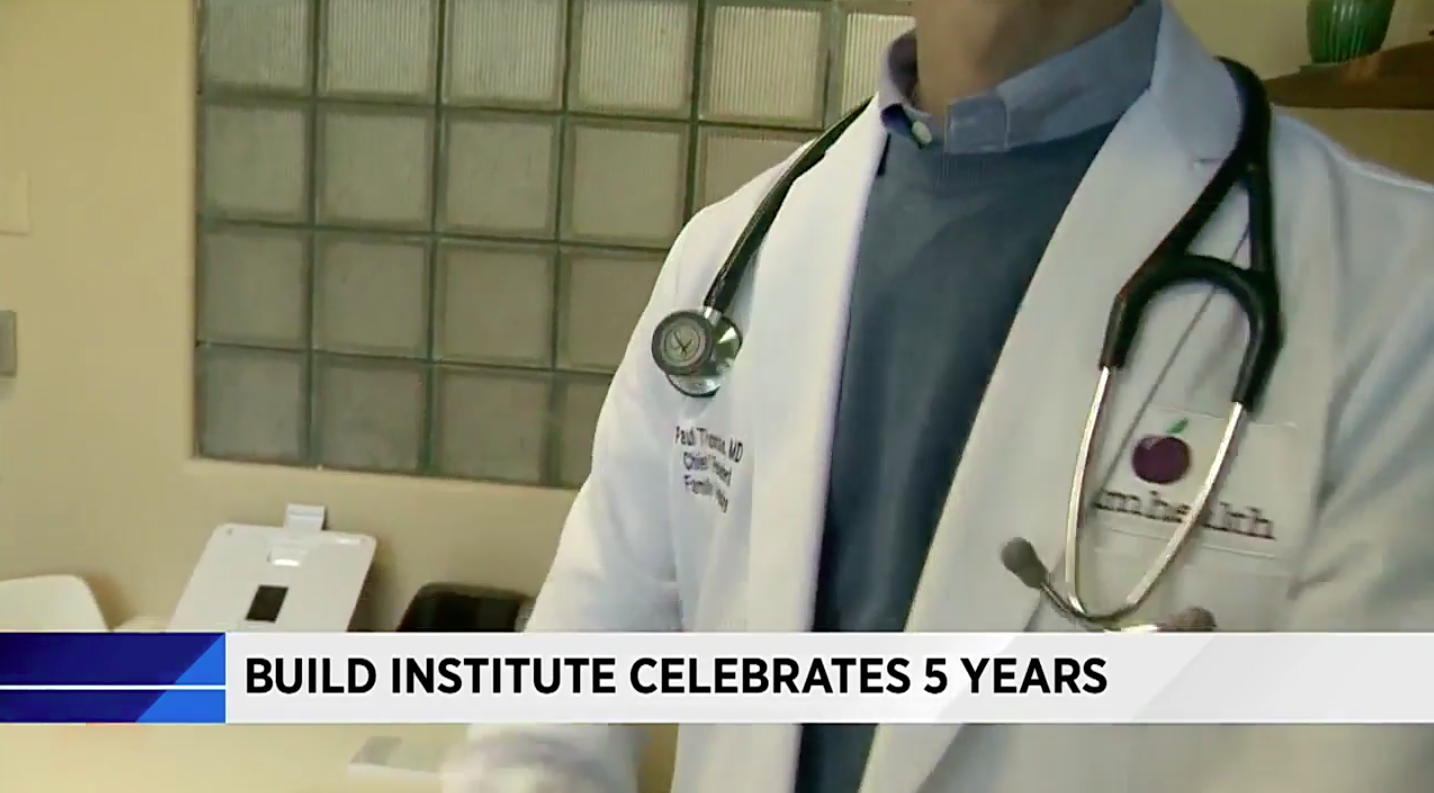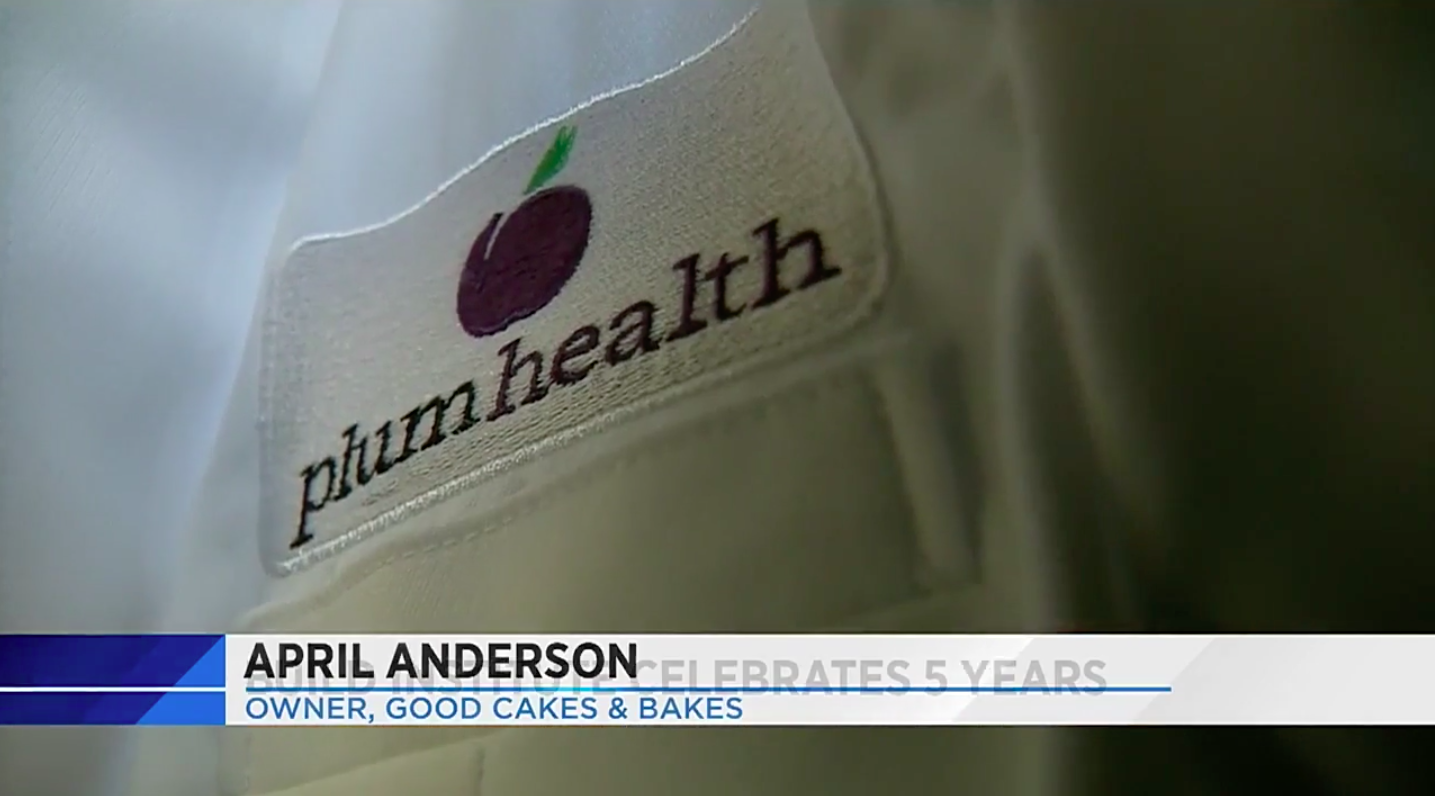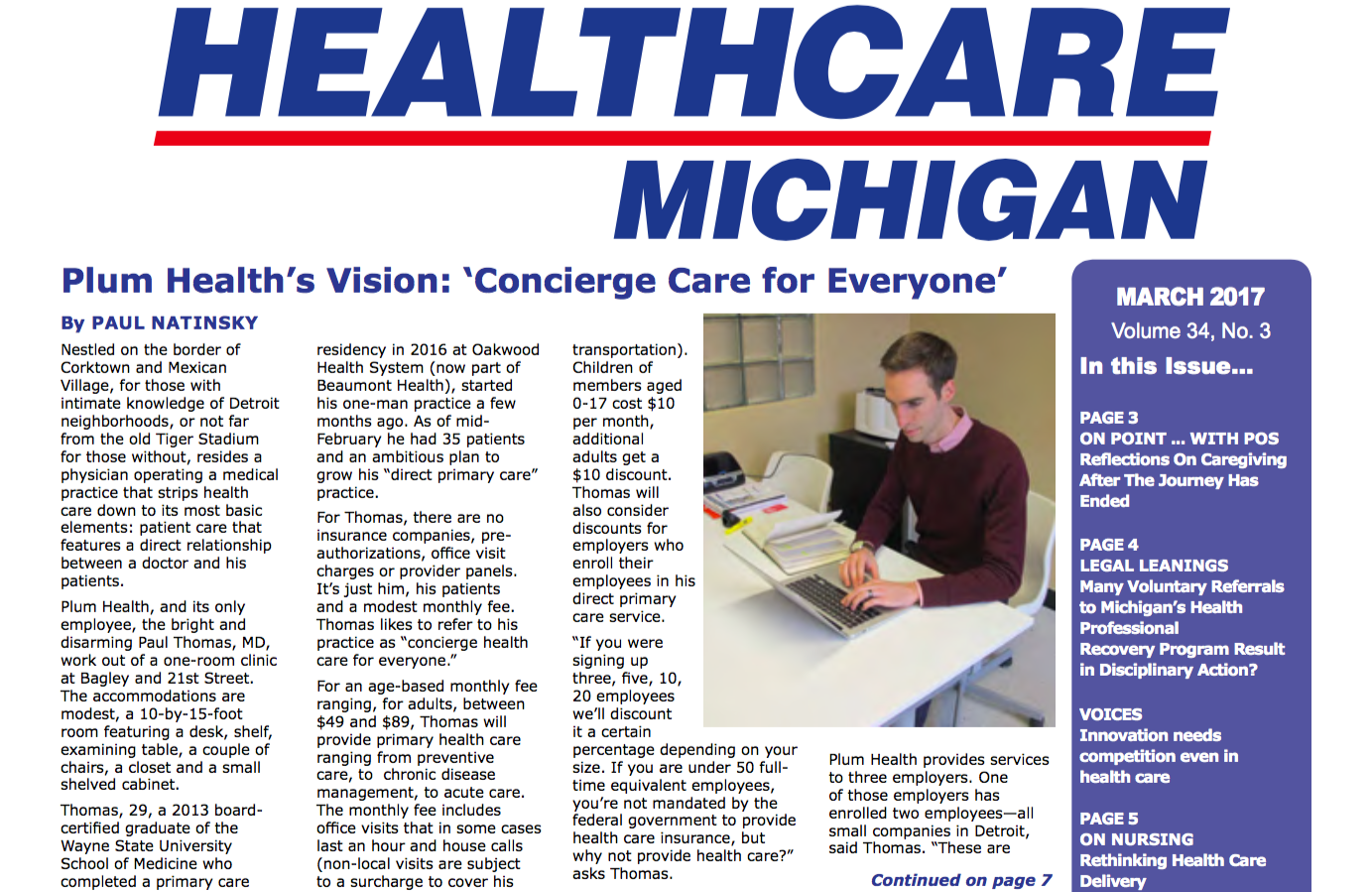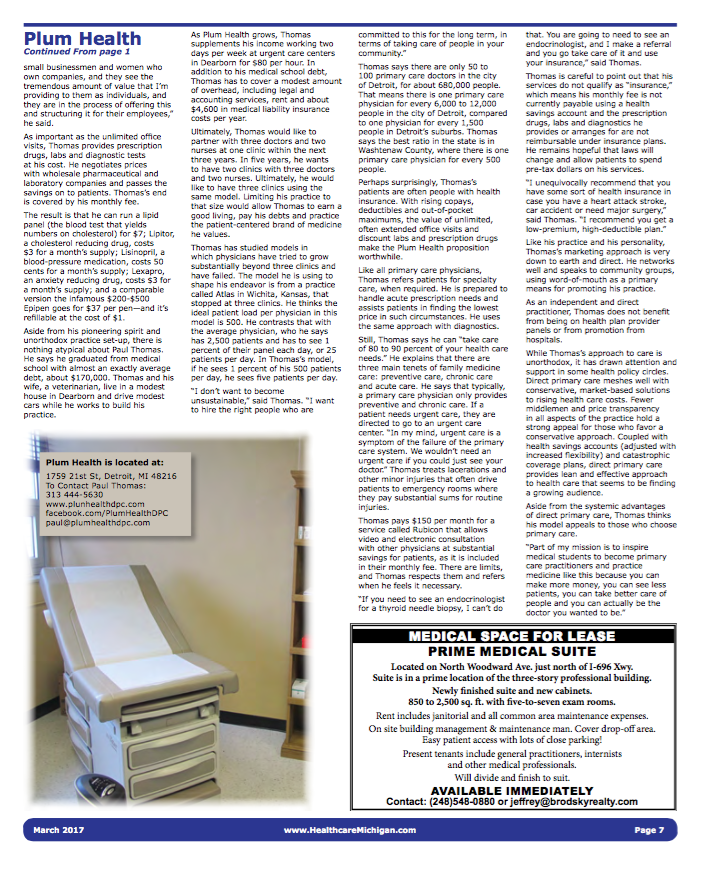Plum Health Blog
Plum Health Featured in Model D Media
Today I'm ecstatic to see Plum Health DPC mentioned by Model D Media. If you're unfamiliar, Model D Media is a relentlessly positive digital publication that focuses on art, architecture, business, and development in and around Detroit.
The article featuring Plum Health DPC was entitled "8 Detroit startups that could change the world." Here's their take on Plum Health:
Plum Health DPC
Your own personal doctor, on call and on demand. That’s what Dr. Paul Thomas is pitching with his Plum Health practice in Detroit. Rather than pay a doctor for each visit, Thomas is instead instituting a monthly subscription-style service for his patients. What’s more is that you don’t need health insurance for his services (though Thomas does encourage patients have health insurance as he doesn't offer hospital-type healthcare).
Dr. Thomas’s patients receive unlimited care for a monthly fee, which breaks down as follows: Ages 0 to 17, $10 per month; 18 to 39, $49 per month; 40 to 64, $69 per month; and ages 65 and up, $89 per month. The service results in significantly cheaper lab tests, prescriptions, and more.
Dr. Thomas could disrupt the field of primary care, right from his office in Detroit.
A tweet from @ModelD about Plum Health DPC, a startup in Detroit that could change the world.
Thanks for reading, and have a wonderful day,
- Dr. Paul Thomas with Plum Health DPC
Plum Health will pitch at Detroit Demo Day
Plum Health DPC will pitch at Detroit Demo Day, and there's $100,000 on the line! That money goes to the top vote getter, so we need to pack the house and get a lot of votes - help us make health care more affordable and accessible. Be in the audience, cast your vote, get your tickets here!
Also, there's a ton of news coverage about the event, from Crain's Detroit Business, to the Detroit News, and even the Seattle Times!
Thanks for reading, and have a wonderful day!
- Dr. Paul Thomas, MD with Plum Health DPC
Plum Health DPC Mentioned in Business Insider
This week, I was delighted to see Plum Health DPC mentioned in two different publications. The first was an excellent, comprehensive piece on Direct Primary Care in Business Insider by Lydia Ramsey.
Ms. Ramsey and I have spoken over the phone about the Direct Primary Care movement, and she asked several insightful questions about our practice in Detroit, Michigan. She has spoken with roughly 16 other DPC doctors and synthesized a great summary of the movement in her article.
I loved the chart she used to compare and contrast traditional Fee-For-Service medicine with Direct Primary Care services:
Next up, we were mentioned in the South Florida Sun-Sentinel article on Direct Primary Care written by Ron Hurtibise. The article discusses Direct Primary Care and the efforts in the Florida Legislature to make DPC 'legal' in that state.
Fortunately, in Michigan, Direct Primary Care has been 'legalized' via the efforts of State Senator Patrick Colbeck and his Senate Bill No. 1033. I have placed legal and legalized in quotations above because practicing Direct Primary Care or retainer-based medicine is not illegal, but having laws on the books like Senate Bill No. 1033 in Michigan and the proposed HB 37 in Florida removes any potential legal challenges and allows doctors who want to practice DPC medicine a clear path.
And we need more doctors having a clear path to the type of medical practice that they can enjoy and sustain for the long term. We need more doctors practicing primary care medicine. One of the arguments against DPC is that the panel size is smaller in the typical DPC practice as compared to the traditional Fee-for-Service practice. In the Sun-Sentinel article, a part of my LinkedIn article was quoted:
"As to the charge that Direct Primary Care contributes to the shortage of primary care doctors, Paul Thomas, a doctor with Plum Health DPC, wrote in an essay published on LinkedIn.com last year that the model might actually encourage more medical students to become primary care doctors, rather than pursue higher-paying specialty fields.
"A Direct Primary Care practice with 500 members can provide a primary care provider with more income than some earn with 3,500 patients at a fee-for-service practice, Thomas wrote. And the increased time for personal interaction eliminates “role strain” and allows the provider to address patients as whole people, he said.
I believe that Direct Primary Care practices provide physicians and patients with a better primary care experience, and will allow doctors to practice for longer periods of time without retiring early or leaving the field completely because of burnout. I'm happy to see the DPC movement spreading across the country, and I'm happy to be quoted in these two publications.
Thanks for reading!
- Dr. Paul Thomas with Plum Health DPC
Plum Health Featured on the Detroit Rising Podcast
This week, Plum Health DPC was featured in Crain's Detroit Business in an article by Senior Reporter Chad Livengood. There is an accompanying audio recording of the interview, here.
The Detroit Rising Podcast focuses on business and commerce and the intersection of Public Policy in Detroit. It was a pleasure to be featured on the podcast and on the Crain's Detroit website. Additionally, Chad Livengood brings excellent insights along with his investigative reporting.
In the audio segment, Mr. Livengood states, "one of the biggest challenges to rebuilding Detroit is getting service-based businesses to set up shop after decades of disinvestment." And, Plum Health DPC is one of those service-based businesses, and it was exciting to discuss how we're making health care more affordable and accessible in Detroit.
During the interview, we talk about the Direct Primary Care business model, the availability of primary care physicians in Detroit, and what the City of Detroit is doing to improve the quality of life in the city.
Thanks for reading and listening, and have a wonderful day,
- Dr. Paul Thomas with Plum Health DPC
A screenshot from the Crain's Detroit webpage featuring our interview.
On February 20th, we were featured on the front page of the Crain's Detroit Business webpage, you just might have to squint to see us!
These Mobile Businesses are Changing the Game in Detroit
Running a successful business is tough. Running a successful mobile business can be even more difficult! This week, I participated in a panel discussion that took a deep dive into what it takes to run a successful mobile business in Detroit.
The panel was a part of Build Institute's Open City series, and featured four business owners: Lisa Waud of Pot and Box, Alleah Webb of Drifter Coffee, Ebony Rutherford of Trish's Garage, and Paul Thomas, MD (that's me!) of Plum Health DPC. The panel was expertly moderated by Sarah Donnelly of TechTown Detroit.
Build Institute's Open City Panel, featuring Ebony Rutherford, Alleah Webb, Paul Thomas MD, and Lisa Waud. The panel was moderated by Sarah Donnelly. The event was hosted by Build Institute's Christianne Malone.
Ebony Rutherford of Trish's Garage talked about the choosing the right events to attend, citing that it's easy to lose money by purchasing table space at a poorly attended event. However, turning lemons into lemonade, she would take that time at a slower event to work on her social media production and marketing.
Alleah Webb of Drifter Coffee has built a successful business around an Instagram-able/Pinterest-able mobile coffee house. Her business is among the most unique in Detroit, creating a mobile coffee experience for her audience.
Alleah often participates in public events, like Noel Night, Open Streets Detroit, and MoPop Detroit, and she has also found success by catering to private events, like weddings. This all makes for an interesting story, and Drifter Coffee has gotten some great traditional media exposure, as in this Hour Detroit article.
Lisa Waud of Pot and Box also created a ton of buzz from not only having a mobile flower shop, but also by creating The Flower House Detroit. In the panel, she talked about the pros and cons of operating out of a truck that can have adverse effects on their inventory. For example, when it's 90 degrees outside, the flowers can wilt in less than 3 hours if they are in the truck.
As a business person conscious of profit and loss, she is considering the costs and benefits of continuing the flower truck operation. It's expensive to have insurance for a mobile business and it takes a lot of energy and staffing costs to operate successfully.
Build Institute's Open City Detroit event, held at the Atwater Brewery, 237 Joseph Campau Ave, Detroit, MI.
This was an important point in the conversation! Is a pop-up business/mobile business the end goal or a means to an end? Sometimes, a mobile or pop-up business can lead to a permanent brick-and-mortar establishment. On the other hand, some entrepreneurs prefer the mobile/pop-up business model as it can greatly reduce overhead costs.
For me, having a mobile offering in the first few months of our operation of Plum Health allowed us to operate with a low overhead while building momentum. The goal was to engage enough customers to justify leasing out an office space. Once we had enough momentum, we were able to lease out our office and build from there.
At Plum Health, we still offer house calls to our members, but now there is an added cost to these house calls, whereas house calls were standard in the first 2 months of operation.
All in all, this was a great panel, and I learned a great deal from my fellow panelists and from the moderator, Sarah Donnelly. To the folks at Build Institute, thanks for the invite! And I'm looking forward to the next season of Open City!
- Dr. Paul Thomas with Plum Health DPC
Paul Thomas MD on Small Talk with Mark S. Lee
This weekend I was featured on Small Talk with Mark S. Lee. The radio broadcast airs on CBS Radio in Detroit! I was last on Small Talk in March 2017, and since that time, Plum Health DPC has grown in size and I've been asked to participate in some speaking and community events.
In this episode of Small Talk with Mark S Lee, we talk about the TEDxDetroit event that was held on November 9th 2017. We highlight a few of the key points that I spoke about during that event. Foremost, I believe that health care should be affordable and accessible for everyone. Second, we talk about how doctors can be overloaded by their patients' concerns, and those concerns can slip through their fingers, like grains of sand.
We also give an overview of Direct Primary Care and how you can find a Direct Primary Care doctor near you by using the DPC Mapper online.
Mark asks what's wrong with our current system? And I respond by saying that the prices in the health care ecosystem are inflated, which makes health care unaffordable for many people.
To illustrate, I make an analogy about Health Insurance vs. Auto Insurance. If we used our Auto Insurance policies to pay for tire rotations, oil changes or gasoline, those prices would be significantly inflated. However, that's exactly what we do with our Health Insurance policies.
It's always enjoyable being on Small Talk with Mark S. Lee, and this time was a unique experience as the Honorable Former Mayor Dave Bing was interviewed just prior to my time slot! Not only is Dave Bing a former mayor, but he's also in the NBA Hall of Fame. He continues to be an example of great leadership as he continues his work with the Bing Youth Institute, so it was an honor to be a part of the show with him.
Thanks for reading and thanks for watching!
Sincerely,
Dr. Paul Thomas with Plum Health DPC
Plum Health featured in Good Life Detroit
This week, Plum Health DPC was featured on the blog Good Life Detroit. Jennifer is the creative spirit behind Good Life Detroit, and she did a fantastic job writing about our clinic and Direct Primary Care in general.
I really appreciated her perspective as a mother - she notes in the article that she has 5 children! - and that she paid $125 for a 20 minute doctor's visit for one of her children. Contrast that with our clinic, her child could have been seen for a full year for $120, with as many visits as needed included in that price.
This is how we make our primary care services valuable for the community that we serve. If you were not aware, Detroit is a large, low-income population. We recognize this as a fact, and have adjusted our pricing to be accommodating for the community that we serve.
Another great point that she brought up in the article is the frustration that people can experience when trying to reach their doctor! Sometimes reaching the doctor can be like pulling teeth. She puts it more eloquently, here:
"Another great benefit of Plum Health Direct Primary Care is patients have the opportunity to speak directly to Dr. Paul without the hassle of long wait times and call screenings. Instead of having to go through a series of steps just to talk to their doctor, patients can call, text, or email Dr. Paul directly. In some cases, some doctors require you to leave a message with the office staff for a callback.
"Most of the time the office staff member screen’s the doctor’s calls and you have to tell the staff member exactly what it is you need or what your question is. Then you wait for the doctor to call you back, which can be anywhere from the same day or one to two days later, all depending on the doctor’s schedule.
"Members of Plum Health have Dr. Paul’s cell phone number and email address. They can reach him anytime they need to ask a question in regards to their health."
There are several other great points that she makes throughout the article. I was really impressed at her depth and thoroughness. I also appreciate her helping to get the word out about affordable, accessible health care in #Detroit. We're trying to serve as many folks who need this type of care, and articles like these help us to reach communities outside of our circle of influence.
Thanks for reading and have a wonderful day,
Dr. Paul Thomas with Plum Health Direct Primary Care
Plum Health Direct Primary Care is in Detroit, Michigan. We practice old-fashioned family medicine, but we use technology to make ourselves more accessible to our patients when they need us! I love this graphic that Jennifer at Good Life Detroit created for us!
I also really liked this graphic that Good Life Detroit made about our pricing tiers at Plum Health DPC - really easy to read and understand!
Local Detroit Doctor on Channel 4 News WDIV
This week, Plum Health Direct Primary Care was featured on Channel 4 News, station WDIV, in Detroit, Michigan. Plum Health was billed as a service that is saving people "thousands of dollars". While we are able to save folks money on their health care needs, the reason why we do this goes much deeper.
Our mission is to provide affordable, accessible health care in Detroit and beyond. We build relationships with our members and make ourselves available whenever our patients are in need. We make the prices for all of our services transparent so that you can understand both the cost and the value. Here's what WDIV wrote on their webpage:
DETROIT - Dr. Paul Thomas, who runs the Plum Health Clinic in Detroit, might just have a plan to revolutionize healthcare -- it's called Direct Care.
Thomas said everyone needs health insurance in case of catastrophic illness or injury, but he quickly added, "Basic healthcare outside a hospital is actually low cost."
When was the last time "low cost" and "healthcare" showed up in the same sentence?
A hospital test for cholesterol can cost $120; Thomas charges $6.50. A month's supply of Prilosec costs about $17 at the pharmacy, Thomas' clinic members pay 96 cents for the same prescription.
"The more money the insurance companies touch, the more that sticks to their hands," Thomas said.
Thomas argues that Direct Care removes the profit-takers between your dollars and your doctor, and makes affordable healthcare a reality.
I am deeply grateful for the coverage, and am deeply grateful to be a physician taking care of people's medical needs. Please let me know how I can be of service to you, and thank you for reading and watching.
- Dr. Paul Thomas with Plum Health Direct Primary Care
Opinion Published in the Detroit News
Our opinion regarding Health Insurance and Health Care was published in the Detroit News last night, and it is currently on the front of the Opinion Page!
Our opinion made the top of the page for the Detroit News Opinion section on June 5th 2017.
Here's our opinion in full:
Health insurance does not equal health care. As Americans, we often conflate these two entities. But they are in fact separate.
Health care is when you see your doctor. They listen to your story, empathize, perform a physical exam, make a diagnosis, and discuss treatment options. They can also order tests and give you medications. The compassion, the sincerity, the relationship — that’s health care. Health insurance is what covers you in the case of a medical catastrophe, like if you’re involved in an accident, have a heart attack or a stroke. Health insurance is a financial tool to prevent you from going bankrupt in case these catastrophic events occur.
These may seem like obvious statements, but we’ve grown accustomed to a system in which health insurance covers everything, from flu shots to ICU. This may not be a terrible thing; we all need flu shots, and some of us may end up needing ICU care. The problem exists in how we pay for these services.
If we continue to ask insurance companies like Blue Cross Blue Shield and government entities like Medicaid and Medicare to pay for all of our health care services, from blood pressure medications to cardiac bypass surgery, costs will continue to be inflated.
So if you’re paying $10 for your lisinopril each month, know that it actually costs $0.37. If you’ve paid $120 to check your cholesterol this year, know that it actually costs about $6.55. If you’ve ever paid $150 for a chest X-ray, it actually costs about $40. When we use our insurance cards to pay for the basic, routine health care services, prices are inflated. Fortunately, we now have a choice, an opportunity to use free market principles to save money on our health care services. More Direct Primary Care clinics are popping up in Michigan and across the nation.
Direct Primary Care doctors ask that patients pay a monthly membership, which allows them unlimited visits with their doctor and the ability to call, text or email the doctor any time. These doctors also provide wholesale medications, at-cost labs, and at-cost imaging services. By cutting out the middle man and asking consumers to pay for their basic services, the cost of these basic services decrease. Typical savings for medications, labs and imaging services range from 50 percent to 90 percent.
Ideally, people will pair DPC services with a health insurance plan that fits their needs and their budget, and covers them in case of a catastrophic event.
Paul Thomas, M.D., is a family doctor at Plum Health Direct Primary Care.
A screenshot from our Opinion in the Detroit News on June 5th, 2017.
Thank you for reading and have a wonderful day,
Dr. Paul Thomas with Plum Health Direct Primary Care in Detroit, Michigan
Direct Primary Care on NBC News
This week, Direct Primary Care was featured on NBC Nightly News with Lester Holt. If you are unfamiliar with this new model for healthcare delivery, Direct Primary Care is a membership model for healthcare that charges a relatively low fee for primary care services. The NBC News team starts out the piece by discussing the amount of time that the doctor is able to spend with the family, "maybe 30 - 45 minutes". At Plum Health, our visit time is about 1 hour for initial visits and 30 minutes for follow ups, so on par with what was stated in the video.
The video then goes on to discuss the benefits of Direct Primary Care with unlimited visits and the ability to text message the doctor for a flat, monthly fee. For most direct primary care doctors, patients are able to visit the doctor and have digital interactions with the doctor whenever necessary. At Plum Health, our patients can call, text, and email anytime and see us in the office anytime they need us.
The article then discusses the cost of the monthly membership, which is typically between $25 and $85 per month. In our case at Plum Health DPC, our prices are between $10/month for children up to $89/month for adults over 65 years of age. Young adults under 40 years old pay $49/month and adults over 40 years old pay $69/month. Direct Primary Care practices across the country typically fall in the $10 - $100/month range. Any monthly charges over and above $100 gets into the realm of Concierge Medicine. We wrote a previous blog post about the difference between Direct Primary Care and Concierge Medicine, here.
The NBC Nightly News piece goes on to discuss what's included in or what is covered by a typical Direct Primary Care practice. Typically, DPC practices cover unlimited primary care visits. At Plum Health DPC, our patients have unlimited visits with Dr. Paul, unlimited texting, emails and phone calls or unlimited digital communication. In addition, we charge at-cost pricing for routine lab tests and we charge wholesale prices for medications. Some doctors choose to include some basic blood work in the cost of the membership.
Because we don't charge an enrollment fee, we chose not to include basic blood work in our service. Instead, we perform at-cost labs at Plum Health. Complete blood cell counts are $4, Comprehensive metabolic panels are $6, Thyroid Stimulating Hormone tests are $6, Lipid panels are $6.55, and we have a modest draw fee of $2.
Families save money by choosing Direct Primary Care. The NBC News article discusses how the family featured in the video saves $500 each month by using a Direct Primary Care service and pairing that with a low premium, high-deductible plan.
This pairing of services is the ideal way to save money on your health care expenses. The issue that some people run in to is finding that Catastrophic coverage plan. Many of those plans have gone away after the Affordable Care Act was signed into law by President Obama. This is one of the many road blocks to wider implementation of Direct Primary Care plans. The other impediments include the inability to use Health Savings Account funds for DPC plans.
The next part of the article gets into the philosophy of Direct Primary Care. It talks about how Dr. Cunningham left a traditional family medicine practice. Now that he operates a Direct Primary Care practice, he sees fewer patients and makes less money. But, the income loss is worth it to him, so long as the insurance companies no longer dictate how he's supposed to take care of patients.
This part of the video touched a nerve with me. So often, we as doctors do not take care of our patients in the most optimal or ideal way because of the barriers put in front of us by insurance companies. By not accepting insurance company dollars, we are free to take care of patients in the way that they deserve to be taken care of. Dr. Cunningham says "It feels great to be practicing medicine the way it's supposed to be", and I agree!
Operating Plum Health DPC has allowed me to develop deep, trusting relationships with my patients that I never got to experience as a resident or in a traditional practice. The element that is so important to developing this relationship is time. When I am able to spend an hour with each patient during each visit, I am able to give them my full attention and deliver the kind of care that they deserve.
Dr. Cunningham, a Direct Primary Care doctor in Massachusetts, talks about how he is able to practice medicine the way he's supposed to be.
On the other hand, the article highlights the critical elements of Direct Primary Care: "Critics say there's already a shortage of primary care doctors". They don't really expound upon this thought or bring this thought to its logical conclusion, which is that if we already have a shortage of primary care doctors, then it is inexcusable for those primary care doctors to see less patients.
I take umbrage with this remark. There is a dearth of excellent primary care doctors because the practice of primary care medicine is one of the most challenging fields in medicine and it is often the lowest paid field in medicine. Medical students often choose higher-paying specialties in medicine that come with greater job satisfaction and less role strain.
I see the practice of Direct Primary Care as solving some of the issues with the current system. DPC medicine helps to eliminate the role strain that young doctors feel. When I have an hour to take care of a patient, I can really address them as a whole person. In the traditional or fee-for-service model, a primary care doctor has 10 - 15 minutes to address the whole patient, and this is nearly impossible. I've been there, seeing patients at this rate, and the best you can do is address 1 or 2 concerns before you have to move on to the next patient.
Direct Primary Care also can offer doctors a chance to earn a greater income if they have a panel of roughly 500 patients or members in their DPC practices. Some doctors choose to see less patients in their DPC practices, and therefore would make less money, but there is an opportunity to increase primary care doctors' salaries.
By eliminating the role strain that primary care doctors experience and by paying them a better salary, we can attract more medical students to primary care medicine fields like family medicine, general internal medicine, and general pediatrics. I take umbrage with the thrust that doctors should not see less patients because the system is broken.
It would be worse to see the system perpetuated with exhausted, frustrated, burnt-out primary care doctors seeing 2,500 patients each year. It would be better to have more medical students attracted to primary care fields, seeing 500 patients each year, limiting their role strain and increasing their incomes.
Another critique is that Direct Primary Care does not cover specialists visits or hospitalizations. I find this to be a moot point because the main thrust of Direct Primary Care is to deliver primary care services directly to our patients. We make no mention of Direct Specialty Care or Direct Hospital Care, and we make no attempt to promote these services in our offerings.
Too often, American consumers conflate "health care" with "health insurance", but these are distinct and separate services. You need to have health insurance, either a low-premium, high-deductible plan or a catastrophic coverage plan. This health insurance does exactly what the name implies: it insures you and your health against major, unexpected events.
Direct Primary Care, then, delivers the affordable, every-day primary care services that are needed by you and your family. You need to have primary care coverage, but you shouldn't have to pay an insurance company to pay your primary care doctor for what amounts to low-cost primary care services.
It makes sense to pay an insurance company to pay hospitals and surgeons for higher cost care, but it doesn't make sense to pay insurance companies to pay your primary care doctor for relatively lower cost primary care services.
As a side note, Plum Health DPC does offer specialists consultations for difficult clinical questions through our relationship with Rubicon MD. This allows us to ask about diagnostic testing, special labs to order, or to help us solve a difficult problem. But, as in the video, we do not offer specialists visits as a part of our service.
The closing thought from the NBC Nightly News video is that despite the drawbacks, it is worth it for some individuals and families to pay for Direct Primary Care services. As a Direct Primary Care doctor, the benefits are clear: you have a doctor on call for you any time you need it and access to time and cost-saving auxiliary services. The NBC reporter says that "Direct Primary Care is the answer, to save money and have a doctor who's always 'in'".
Thanks for reading and have a wonderful day,
- Dr. Paul with Plum Health DPC
Plum Health Featured in Crain's Detroit
This week, Plum Health DPC was featured in Crain's Detroit Business. The opportunity came up after meeting with Mark S. Lee on his program, Small Talk with Mark S. Lee. During the on-air interview, we only had 15 minutes to talk about Plum Health and Direct Primary Care. It simply was not enough time to get down into the nuances of what Direct Primary Care is, the mission of Plum Health, and the future of health care and health care policy in this country.
This follow up interview in Crain's Detroit allowed for a deeper dive into these nuances, and so I must thank Mark S. Lee and the Crain's Detroit editorial team for working with me and publishing this important piece. You can read the full article here.
I truly believe that Direct Primary Care will play a greater role in our health care ecosystem as people/health care consumers wake up to the actual cost of their medical care. By making health care prices transparent at Plum Health DPC, we allow people to use free market principles to purchase the health care that they need.
Thanks so much for reading, thanks again to Mark and Crain's Detroit, and thank you the readers, followers, patients, and supporters that make Plum Health DPC possible!
- Dr. Paul with Plum Health
Plum Health DPC Featured in The HUB Detroit
This week, we were featured in an article by The HUB Detroit, a local publication that focuses on Detroit neighborhoods. From their mission statement, they emphatically state: "our focus is Detroit’s neighborhoods. TheHUB’s multimedia platforms were created to give Detroit city residents and supporters a dedicated voice and space to discuss the real issues surrounding viable city neighborhoods."
I am happy to be working in the neighborhoods in the City of Detroit, serving folks of diverse backgrounds via my clinic in Southwest Detroit. The article touched on this point by relating that I am embracing the neighborhood where I practice medicine. It's true - I spend a lot of time reaching out to folks in the community like small business organizations, small business owners, and non-profit groups like the Ford Resource and Engagement Center.
Our goal is to improve the health and wellness of not only individuals, but also the community and we achieve this by delivering affordable, accessible healthcare in our community.
I really appreciate the time that the editorial staff took to share the Plum Health story, and I'm excited for what the future holds for health in our City and our region.
Thanks for reading, and have a wonderful day,
- Dr. Paul with Plum Health
Plum Health at Build Institute
This week, I was invited to sit on a panel at the Build Institute to celebrate their 5th year of investing in and uplifting small businesses in the City of Detroit. Fortunately, I was able to take and graduate from a Build Institute course over the summer of 2016.
This Build Institute Course allowed me to develop and solidify my business plan, make connections with fellow entrepreneurs, and tap into Build's ever-expanding network of small business owners and service providers. Through Build, I was able to be a part of big events like Detroit Homecoming sponsored by Crain's Detroit. I was also able to meet future customers and future service providers like my lawyer.
On Wednesday, I was invited to sit on a panel of small business owners who have benefitted from the Build Institute's unique programming. It featured Lana Rodriguez of Mama Coo's Boutique, April Anderson of Good Cakes and Bakes, April Boyle of Build Institute, and Christianne Malone of Build Institute.
After the panel, Steve Garagiola of Local 4 News (WDIV) asked if I'd be interested in an interview. I invited him to my office at 1759 West 21st Street, Detroit MI, and he came over with his cameraman. During the interview, we discussed the basics of what we provide at Plum Health DPC.
I was surprised at how fast the turn around time was for the interview, as it aired during the 6 pm news on Detroit's Local 4 News. In case you missed it, here's the interview!
In addition, Kurt Nagl, a writer from Crain's Detroit wrote an article about the event and it appeared on their website on Tuesday.
Thanks so much for reading and watching!
- Dr. Paul with Plum Health DPC
Plum Health Featured in Healthcare Michigan
On February 9th, I was invited as a panelist at the Future of Healthcare event at Wayne State University School of Medicine. While at the event, I met Paul Natinsky, a writer for Healthcare Michigan. Friendly, outgoing and genuinely interested in the work that I was doing, Mr. Natinsky and I scheduled to meet up a few weeks later.
When Mr. Natinsky came to our Plum Health office, he brought his tape recorder and camera, and most importantly he brought his insight and some tough questions. We talked for well over an hour on a variety of subjects. This week, he released his notes from that meeting in the form of a publication in Healthcare Michigan.
The work that we're doing with Plum Health is the feature story in the March 2017 issue, and we couldn't be happier about spreading the word about Direct Primary Care in Michigan. You can read the article in full, here.
Thanks for reading, and have a wonderful day!
- Dr. Paul




